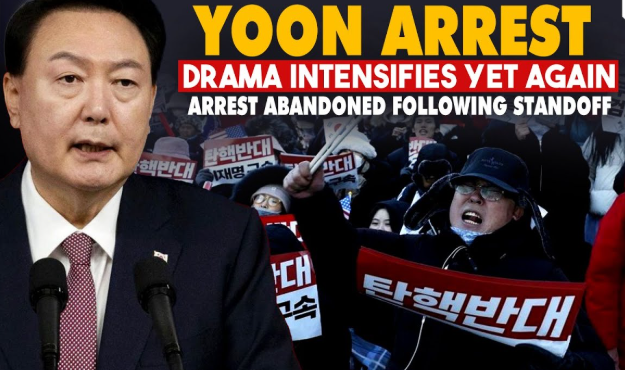Virendra Pandit
New Delhi: In the ongoing political high drama in a democratic South Korea, anti-corruption investigators failed to detain impeached President Yoon Suk Yeol after a nearly six-hour standoff with the presidential security guards, the media reported on Friday.
The continuing crisis has paralyzed the economic powerhouse nation’s politics and witnessed two heads of state impeached in less than a month.
Its anti-corruption agency said it had to withdraw the investigators because of their safety concerns after they were blocked from entering Yoon’s official residence where they went to detain the impeached President for further probe. The investigators regretted the behavior of the suspect, who did not respond to a legal process he was supposed to protect.
The probe agency said it would discuss further actions, but did not immediately say whether it would make another attempt to detain Yoon. The warrant for his detention is valid for one week.
The Friday events unfolded when investigators sought to arrest impeached President Yoon Suk Yeol at his residence over a failed martial law bid, but, local media reported, that security forces blocked their attempts.
Yoon, who has already been suspended from duty by parliamentary lawmakers, would become the first sitting president in South Korean history to be arrested if the warrant is carried out.
The buffeted President, who issued a bungled declaration on December 3, 2024, that shook the vibrant East Asian democracy and briefly lurched it back to the dark days of military rule, faces imprisonment or, at worst, the death penalty.
“The execution of the arrest warrant for President Yoon Suk Yeol has begun,” said the Corruption Investigation Office (CIO), which is probing Yoon’s six-hour-long, short-lived declaration of martial law, with its officials and police seen entering the President’s residence.
CIO investigators, including senior prosecutor Lee Dae-hwan, were let through heavy security barricades to enter the residence to attempt to execute their warrant to detain Yoon, the media reported.
But they were “blocked by a military unit inside” the office after entering, the Yonhap news agency reported. They later “moved past” that unit to “confront security service” members inside the presidential residence.
It was unclear whether the Presidential Security Service, which still protects Yoon as the country’s sitting head of state, would comply with investigators’ warrants. His security had previously blocked attempted police raids of the presidential residence, but it was not immediately clear which units blocked investigators on Friday.
Meanwhile, Yoon’s legal team decried the attempt to execute the arrest warrant, vowing to take further legal action against the move.
“The execution of a warrant that is illegal and invalid is indeed not lawful,” Yoon’s lawyer Yoon Kap-keun said.
Some 2,700 police and 135 police buses were deployed in the sensitive area to prevent clashes, Yonhap reported, after Yoon’s supporters faced off with anti-Yoon demonstrators on Thursday.
Yoon has been holed up inside the residence since a court approved the warrant to detain him earlier this week, vowing to “fight” authorities seeking to question him over his failed martial law bid.
South Korean media have reported that CIO officials want to arrest Yoon and take him to their office in Gwacheon near Seoul for questioning.
Thereafter, he can be held for up to 48 hours on the existing warrant. Investigators need to apply for another arrest warrant to keep him in custody.
After staging chaotic protests on Thursday, some of Yoon’s die-hard supporters, including far-right YouTubers and evangelical Christian preachers, camped outside his compound all night — some even holding all-night prayer sessions.
Early on Friday, they even demanded the arrest of opposition leader Lee Jae-Myung and chanted “Illegal warrant is invalid” as police and media gathered outside the Yoon residence.
Attempting to paint his rivals as ‘communists,’ Yoon has doubled down on claims the opposition was in league with South Korea’s communist enemies (North Korea).
His legal team had already filed for an injunction to a constitutional court to block the warrant, calling the arrest order “an unlawful and invalid act,” and also submitted an objection to the Seoul court that ordered it.
But the head of the CIO, Oh Dong-woon, has warned that anyone trying to block authorities from arresting Yoon could themselves face prosecution.
Along with the summons, a Seoul court issued a search warrant for his official residence and other locations, a CIO official said.
South Korean officials have previously failed to execute similar arrest warrants for lawmakers — in 2000 and 2004 – because of party members and supporters blocking police for the seven days the warrants were valid.

